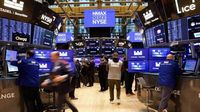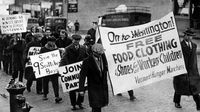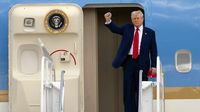In a dramatic turn of events, U.S. President Donald Trump has signaled a willingness to negotiate tariffs just a day after imposing sweeping new duties on 185 countries. This sudden shift in strategy comes amid a significant sell-off in global stock markets, which have experienced their worst week since the COVID-19 pandemic.
On Thursday, April 3, 2025, Trump flew from Washington to Florida, where he engaged with reporters aboard Air Force One. He stated, "It depends," when asked about the possibility of discussing tariffs, indicating he would be open to talks if other countries offered something "phenomenal." This statement marks a notable departure from the hardline stance taken by his administration.
Trump's remarks came shortly after his chief trade advisor, Peter Navarro, emphatically declared that the newly imposed tariffs were "not negotiable." This contradiction within the administration has left many analysts puzzled about the future of U.S. trade policy.
In the wake of these developments, the stock markets reacted sharply. The German DAX index is expected to close the week down more than eight percent, marking its largest loss since March 2020. U.S. stocks also plummeted, losing approximately six percent by the start of trading on Friday, April 4, 2025. Futures indicate further losses of around three percent, as investors brace for the potential fallout from a global trade war.
The immediate catalyst for this market turmoil was China's announcement of retaliatory tariffs, which will impose a 34 percent duty on U.S. goods starting April 10, 2025. This response from Beijing has raised fears of a full-blown trade conflict, with analysts at UBS Global Research warning that the likelihood of U.S. stocks entering a bear market is increasing.
Adding to the tension, China has also placed eleven U.S. companies on a blacklist, effectively barring them from conducting business in China. The Chinese government has lodged a complaint with the World Trade Organization against the U.S. tariffs, which have now reached a staggering 54 percent on certain imports.
In the broader context, economists are drawing parallels between the current situation and the Great Depression of the 1930s. Roberto Azevdo, former director-general of the World Trade Organization, cautioned, "Remember what happened in the 1930s when the U.S. raised tariffs with the Smoot-Hawley Tariff Act, and other countries retaliated? We lost two-thirds of global trade in just five years."
However, some economists argue that the current economic landscape differs significantly from that of the 1930s. Jörg Krämer, chief economist at Commerzbank, noted that while the tariffs may echo those of the past, the U.S. economy today operates under different conditions, allowing the central bank to inject liquidity into the market without being constrained by the gold standard.
Despite these differences, concerns about the impact of tariffs on the U.S. economy persist. As Trump continues to pursue aggressive trade policies, many fear that American consumers will ultimately bear the brunt of increased prices on imported goods. This could lead to a slowdown in consumer spending, which would have ripple effects on the global economy.
In addition to the trade tensions, the oil market has also felt the strain. Brent crude oil prices fell by 8.5 percent to $64.21 per barrel, while U.S. oil (WTI) dropped by 9.1 percent to $60.84 per barrel, reflecting fears of reduced demand from Asia and the potential for a global economic downturn.
Warren Buffett's Berkshire Hathaway has managed to navigate the turmoil better than many, losing less than one percent over the week and seeing a seven percent increase for the month. Buffett's strategy of holding substantial cash reserves has paid off during this volatile period.
Meanwhile, gold, traditionally viewed as a safe haven during times of crisis, saw its price dip slightly to $3,088 per ounce after reaching an all-time high earlier in the week. This decline is attributed to profit-taking by investors following a surge in demand.
As countries worldwide prepare for potential economic shocks, nations like Lesotho, which faces the highest tariff rate of 50 percent, are bracing for significant job losses. The textile and diamond export sectors, crucial to Lesotho's economy, are particularly vulnerable to the fallout from U.S. trade policies.
In South Africa, the government has expressed outrage over the newly imposed tariff rate of 30 percent, fearing it will severely impact its economy. As the situation develops, many nations are already exploring countermeasures to mitigate the effects of U.S. tariffs.
In summary, the unfolding trade conflict sparked by Trump's tariffs is reshaping the global economic landscape. With stock markets in turmoil and countries preparing for retaliatory measures, the path forward remains uncertain. As analysts continue to monitor the situation, it is clear that the repercussions of these policies will be felt far beyond U.S. borders.








